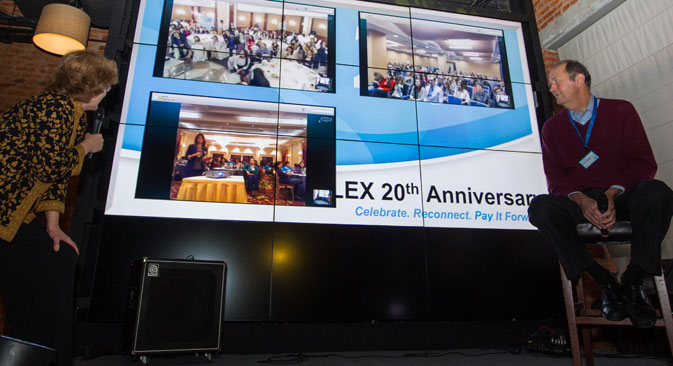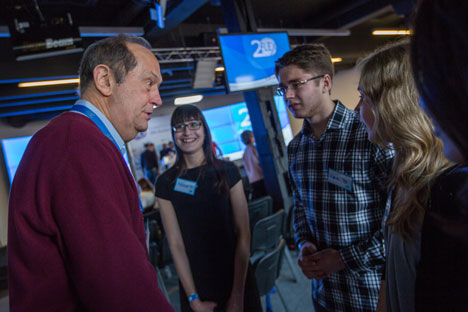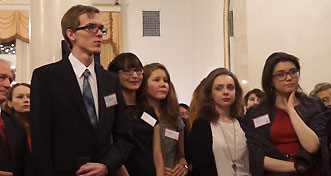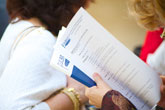FLEX in Russia: Encouraging volunteer spirit

The FLEX program is one of the most competitive U.S. Government exchange programs with an acceptance rate lower than Harvard University. Source: Irina Kalashnikova
When former Democratic Sen. Bill Bradley from New Jersey started advocating student exchanges some 20 years ago, he argued that Russia was facing important changes and would become a new country. The Soviet Union had just broken up, and Bradley and his congressional colleagues felt there was an opportunity to invest in developing future democratic leaders in the region.
Bradley and his colleagues’ ideas soon formed the Future Leaders Exchange program, or FLEX, after the senators persuaded the U.S. Congress to give substantial funding under the FREEDOM Support Act signed in 1992. FREEDOM was the acronym for Freedom for Russia and Emerging Eurasian Democracies and Open Markets
FLEX celebrated its 20 anniversary in November. During two decades, nearly 22,000 high school students from the former Soviet Union, the countries that it primarily targets have participated in the program, with more than 7,800 of those students being from Russian regional.

Ex-Senator Bill Bradley greets FLEX students. Source: Irina Kalashnikova
“The idea of selecting kids to go to live with American family for a year is the basic point of the program,” Bradley told RBTH in a recent interview.
“The whole purpose of the program was to bring people together and show how basically we are all the same,” he said. “And that should be the continuing objective and, hopefully, be a long-term outcome of the FLEX program.”
According to American Councils for International Education, the FLEX program is one of the most competitive U.S. Government exchange programs in Russia — and, in fact, the world — with an acceptance rate lower than Harvard University.
FLEX in Russia: Interview with Bill Bradley. Source: YouTube / RBTH
“During the 2012-2013 academic year, over 17,000 Russian high school students participated in the FLEX selection process and 239 of them were selected as winners – a 1.4 percent selection rate,” American Councils for International Education said in a statement. “By comparison, Harvard’s selection rate was 5.9 percent in 2012.”
Bradley confirms this statistics, saying it was easier to get into Harvard than it is to get into the FLEX program, proving there is “a tremendous demand for the program.”
The achievements of the program “are represented in the lives of the students who participated in the program,” Bradley said. “They are contributing to the future of Russia or the former [Soviet] republics. They found parts of themselves they didn’t know existed.”
Bradley said he believed that such exchanges allow people to know each other as human beings and to establish long-lasting bonds.
“I talked to a number of kids who say their American families have come to see them in Russia, or they met elsewhere in Europe,” he said. “And the families of Russian kids now have relationships with the American families that hosted their children.”
More importantly, Bradley said many FLEX alumni are now moving up in major positions in law firms, accounting firms, academia, and governments. It’s about trying to allow people to maximize their potential, he said.
“One of the achievements of our program is that when exchange students go to the United States, they are challenged and encouraged to try new things, to test themselves, to be as open as they can to all the possibilities, and to bring that back when they come home and use that experience,” said Mary Shea, the Eurasia FLEX Alumni Program Manager.
For example, all FLEX students are asked to do volunteer hours in which they get a new perspective on how people solve problems on local level in their own communities, Shea said.
“Our alumni program is really designed to encourage community involvement, volunteer activity, to address local issues, the things they care about,” Shea said. “I feel like that’s really an amazing achievement of our program is that we instill that volunteer spirit.”
Yulia Simonova, a FLEX student in 2001–2002, works at Perspektiva a Russian, nongovernmental organization focused on people with disabilities. Simonova, who uses a wheelchair, is is helping children with disabilities go to regular schools and kindergartens.
“The “FLEX” program was not just a great and unforgettable experience for me, but also it was the start of a new stage in my life,” she said. “I learned that people with disabilities should have the same rights, same opportunities as other people. I went to a regular school in America, participated in many different school activities. Most importantly, I started to believe in my abilities and myself. The FLEX Programs have made a huge difference in my life and helped me to make my dreams come true. Now I can say that I am truly independent, confident, active, open-mind and a very happy person.”
All rights reserved by Rossiyskaya Gazeta.
Subscribe
to our newsletter!
Get the week's best stories straight to your inbox

